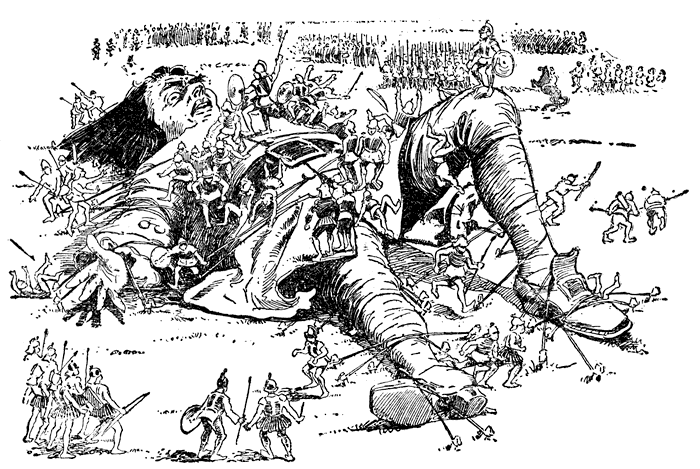
Recently I have had the good fortune of listening to a conference by political theorist John Keane. In a nutshell, what he told us is this after 1945 democracy started to morph into a model that he calls monitory democracy. In this model, the control functions are not only allocated to the legislative power and variously representative institutions arranged in the classic checks and balances scheme, but are also arrogated by citizens through media. The present phase of media democratization and pulverization is greatly increasing the effectiveness of this second type of control; furthermore, it is taking it to a global level, thanks to Internet-native organizations like Wikileaks, that have no national allegiance. The presentation’s key slide was the image you see above, with Gulliver tied down by Lilliputians. Keane used this image as an allegory of monitory democracy: with many ties, though each one is hair thin, the Leviathan can be immobilized.
With all due respect, I find this model unconvincing. Firstly, it is inadequate as a positive model: it does not describe reality accurately. According to many thinkers (including Clay Shirky, extensively quoted by Keane himself), the main novelty of the networked society is not an augmented ability for monitoring and blocking (though that is there too), but an augmented ability for barn raising on an unprecedented scale. Granted, the Internet gave us a great many blog that can sustain prolonged wrangles with public authorities on very specific issues, like no instantiation of traditional media could ever do. But above all it gave us Wikipedia, Ushahidi, Katrinalist/Person Finder and many more tools for building commons. This is no patch: it opens up radically new paths for development.
Secondly, monitory democracy is inadequate as a normative model: it’s not nearly all we need. We are faced with life-and-death challenges: contain global warming, redesign the social contract to make it acceptable for the young generations, bring finance back under control. To make a credible attempt to win them we are going to need effective, resourceful, proactive governance. Like poor tied-down Gulliver, Keane’s democracy feels horribly tractionless: think a car with strong, highly sensitive brakes and a comparatively very feeble engine. Personally, I find that the Internet’s greatest gift is that it increases our power to act collectively, not that it decreases it. By collaborating with them, we can empower institutions, keep them in check if they go bad, and help steering them, all rolled in one package. It would be irresponsible not to use this gift for the survival and thrival of the species. Even Lilliputians came to sense and freed Gulliver, harnessing his giant strength to destroy the menacing fleet of Blefuscu. I hope and believe we will have the same sense.